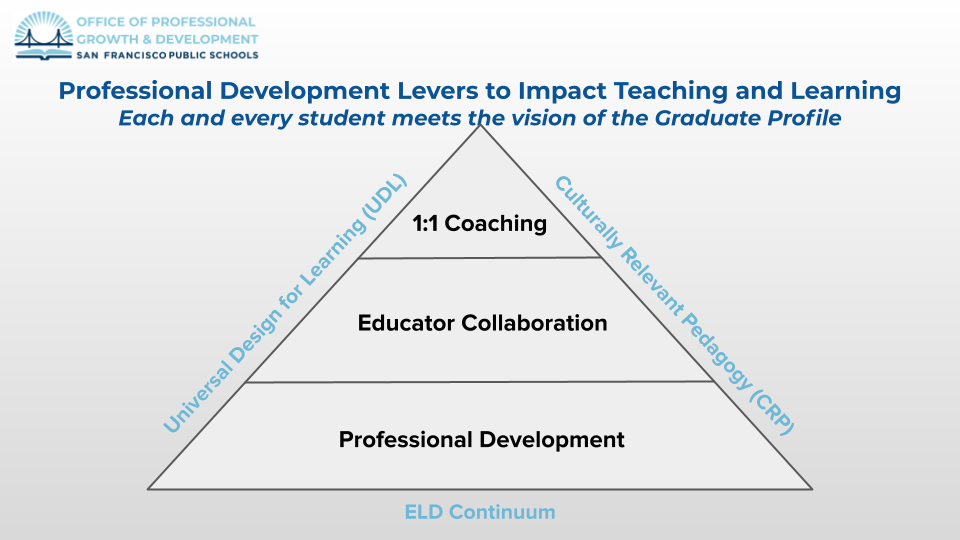Instructional Leadership Link to this section
Processes and systems in schools either reproduce existing patterns of achievement and school experience or have the potential to transform them to leverage greater access and equity for all students.

“We must do everything in our power to cease the behavior that makes children everywhere feel afraid.”
Alice Walker
Instructional Leadership Levers
Link to this section
Leaders have the responsibility to develop intellectually rigorous and coherent school-wide systems of curriculum, instruction and assessment to achieve the school’s equity vision. The following categories provide resources and examples for each instructional leadership lever.
Guiding and Facilitating Professional Learning
“Professional learning” is an authentic process in which all educators engage to become more capable in doing the work of improving outcomes for the most historically underserved youth. This concept of professional learning requires continuous learning (Wei, et al., 2009). Professional Learning is data or goal driven based on student or school site need. Structures are intentionally collaborative and focus on how the professional development experience impacts teaching and learning.
- Planning template
- Schedule of centrally-offered PD
- Research on best practices
- Research on Transfer of Training (Joyce and Showers)
- Reflective Practice for Continuous Improvement (York-Barr)
- Professional Development: An Effective Research-Based Model (Cooper)
- The Experiential Learning Cycle (planning & agenda design framework)
- Example
Structuring and Supporting Educator Collaboration
Hargraves and O’Connor (2018)’s research summary in Phi Delta Kappan argues that the most successful and sustainable efforts at teacher collaboration are characterized by drawing on expert knowledge or a clear, evidence-based set of practices and strong collegial relationships to create collaborative professionalism. Effective teacher collaboration centers on improving educators’ instructional practice to better serve the students in front of them.
Particular structures and conditions, described in the chart below, as well as strong instructional leadership, create higher quality teacher collaboration that positively impacts outcomes for students. This leadership starts with a clear instructional vision from the site leaders and instructional leadership team. Successful collaboration is regular, examines evidence of student learning to guide instructional practice, and allows the educators to lead the process tailored to their classroom needs, within the overarching priorities of the district, cohort and school (Goddard et al. 2015).
Guiding Principles for Educator Collaboration
- Quality instruction takes intentional planning, collaboration, and follow-through
- Strong student climate mirrors a strong adult climate
- Choice and co-creation supports effective adult learning - flexibility for schools to choose their path
- Uses evidence of student learning to guide shifts in instructional practice
- Grounded in anti racist practices and focused on interrupting inequities
- Clear agenda with outcomes related to changes in teaching and learning
- Clear roles for each member
- Every agenda includes both a time for reflective and collaborative practices
- Facilitated by teacher leader, coach, admin
- Uses inquiry/continuous improvement anchored in evidence/student work
Instructional Coaching
- Instructional coaching for leaders (TLEE)
- Instructional coaching for IRF, literacy coaches, and other instructional coaches
-
Preparing to have a hard conversation
Cultivating, Leading, and Sustaining ILTs and other Teams
- Overview
- Stages of Team Development
- Sample agenda
- Agenda template
- Connectors
- Community agreements
This page was last updated on July 28, 2021

